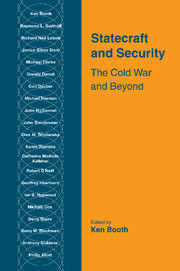Book contents
- Frontmatter
- Contents
- List of contributors
- Preface
- Introduction
- Part one Cold War: lessons and legacies
- 1 Cold Wars of the mind
- 2 Who is to blame for the Cold War?
- 3 Nuclear lessons of the Cold War
- 4 A Cold War life, and beyond
- Part two Post-Cold War: powers and policies
- Part three Beyond: resistances and reinventions
- Conclusion: security within global transformation?
- Index
2 - Who is to blame for the Cold War?
Published online by Cambridge University Press: 06 October 2009
- Frontmatter
- Contents
- List of contributors
- Preface
- Introduction
- Part one Cold War: lessons and legacies
- 1 Cold Wars of the mind
- 2 Who is to blame for the Cold War?
- 3 Nuclear lessons of the Cold War
- 4 A Cold War life, and beyond
- Part two Post-Cold War: powers and policies
- Part three Beyond: resistances and reinventions
- Conclusion: security within global transformation?
- Index
Summary
Some readers may express surprise that the question is even posed. After all, the Soviet Union lost the Cold War and even collapsed under its burden; surely its failure bears witness to its blame. Moreover, being accustomed to believing both that ‘Right will prevail’ and that we are on the side of Right, the outcome is the one that had been expected as well as desired. Possibly others, more cynical, would still assume that since the victors write history, as the adage has it, why bother to raise the question? By now, yet other readers will be preparing themselves for an unexpected conclusion; why introduce the subject this way (or, indeed, at all) unless the author intends to conclude that we (the West) won, but none the less we were to blame? I would, however, hope that readers will avoid prejudgements and bear with me in a fresh look at the question.
By posing the issue as ‘who is to blame?’, rather than ‘what caused the Cold War?’, we are assuming the answer to be certain people – political leaders – and not faceless elemental abstractions incapable of blame, such as a geopolitical contest, a political duel or an ideological confrontation. (I use the editorial ‘we’ in this instance because it was the editor who suggested this title for my contribution, although I take responsibility for accepting it and drawing the inferences from it noted above.
- Type
- Chapter
- Information
- Statecraft and SecurityThe Cold War and Beyond, pp. 56 - 70Publisher: Cambridge University PressPrint publication year: 1998



